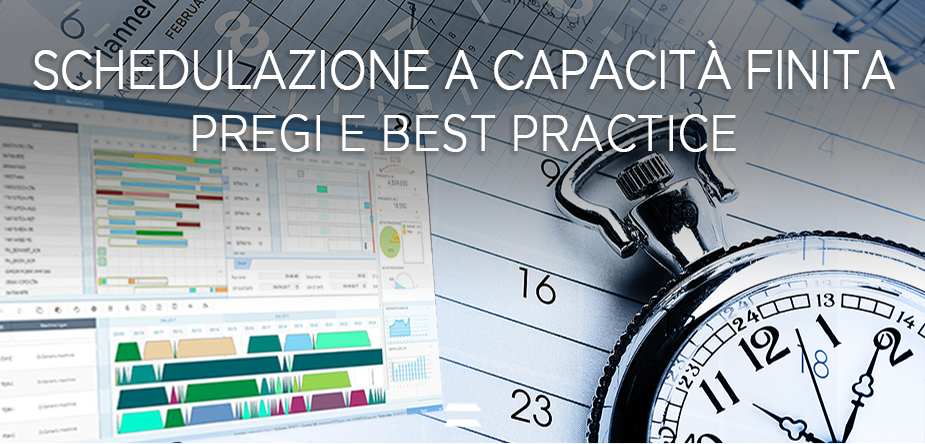Manufacturing production relies on production scheduling to achieve desired levels of efficiency. This is therefore an aspect of fundamental importance, especially now that the delivery times that the customer expects are increasingly shorter and the product mix expands from year to year.
The production schedule and the Master Scheduler
Production scheduling is managed by the Master Scheduler, or Scheduling Manager, whose role is to constantly maintain the balance between demand and capacity of the work centres. Complicating matters are numerous other aspects such as machine failures and downtime, operator absences, identifying and managing bottlenecks, as well as external variables such as cancelled orders, placing unexpected urgent orders and changes in sales forecasts. A role of this type requires a certain experience, as well as a deep knowledge of the individual production reality and its aspects such as machinery, operators and work carried out.
Whatis Finite Capacity Scheduling
With regard to production, finite capacity scheduling is the most effective way to understand what will actually be possible in a given period of time as well as to organise resources in the best possible way, taking into account all the constraints at stake.
The objective of full-capacity scheduling is to ensure that operations proceed at an efficient and possibly even pace within the plant, in order to eliminate bottlenecks.
3 Tools used to make the master scheduler
Let’s take a look at the 3 most used methods for scheduling production:
- manual methods: at the lowest level scheduled plans are created on spreadsheets, whiteboards and magnetic whiteboards.
This method requires a lot of activity on the part of the scheduler who must also have a considerable knowledge of the production reality he manages. In addition to this, it is difficult to face unforeseen events and sharing the plan is hindered (discover the 5 main risks of planning production with Excel). - MRP: in this case, the Master Scheduler has an electronic tool that, albeit with limits, usually allows an MRP to run, thus generating production orders as well as a dispatch list. Sometimes it is possible to make an approximate capacity calculation even if the assumption of infinite production capacity persists. These tools only consider the expected production and have no connection to what is really happening in the plant. These limitations make it difficult to react to changes and manage resources. Most ERP vendors offer such solutions paired with their core software.
- APS: high-performance scheduling. Unlike the methods mentioned in the lower levels, the APS offer finite capacity scheduling, this time offering a realistic model of the production plant in addition to recognising the limits of the plant’s production capacity in real time. An APS automatically takes into account the limits in terms of material, the complexity of the Bill of Materials, work in progress processes, conflicts between machinery and consequentiality of processing as well as the priorities of orders and bottlenecks. An APS software also evaluates the resources available and plans production in order to meet demand, taking into account unforeseen events that are prevented in order to cancel their unpleasant consequences.
The Benefits of Finite Capacity Scheduling
The advantages of having an immediate eyeon the production schedule of your plant in a realistic way are countless and extremely valuable:
- Predict and reduce the actual lead time of the works, based on precise information;
- Optimise the use of resources, including material limits, work centre uptime and staff shifts;
- Reduce quantities in stock and minimize production costs since materials are ordered only when actually needed;
- Have a truly demand-driven production, with more reliable delivery times that increase the level of service and customer satisfaction;
- Notifications and warning messages for greater monitoring of business activity and decision-making with more tools available.
When evaluating whether to settle for what is proposed by the ERP vendor or to equip your company with an advanced solution such as APS, it is good to pay due attention. This is a choice that could have important consequences on the operational efficiency of your business. Read the article to find out more about what an APS is.
Discover CyberPlan for Finite Capacity Scheduling
CyberPlan is the Advanced Planning and Scheduling software that also boasts the ability to schedule production taking into account constraints. If you want to advance your business by equipping it with a tool used by hundreds of companies every day, request a demo.
{{cta(‘ab85071a-d654-4295-bbad-b8e8302eeff7′,’justifycenter’)}}
